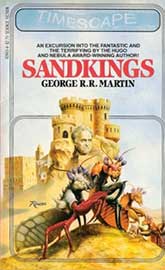Sandkings
Critique • Quotes • At the movies
 First edition of story collection, 1981
First edition of story collection, 1981First publication
1979 in Omni magazine
First book publication
1981 in Sandkings collection
Literature form
Story
Genre
Science fiction, horror
Writing language
English
Author's country
United States
Length
Approx. 15,500 words
The overlord overcome
Long before he published A Game of Thrones (1996), launching the epic series and worldwide phenomenon of A Song of Ice and Fire, George R.R. Martin was making a name for himself in the science fiction world as a short story writer.
It was difficult to classify his stories precisely though, as he tended to blend the genres together in his writing. At the time of "Sandkings" (1981) he was consciously seeking a blend of science fiction and horror. And he succeeded—with a story that's become a modern classic.
Interestingly, the storyline and themes are not particularly new. Martin recycles a lot of tropes from popular genres, including some well-known ones, but the way he puts the story together—the way he writes it—is novel. Several decades after it first appeared Martin's "Sandkings" is still exciting and fresh.
Take the premise: Simon Kress buys colonies of insect-size creatures from a mysterious establishment, thinking he'll get to play god with them. We expect of course they'll grow more dangerous, turn against him and create general havoc. We've seen this story of arrogant man and vengeful monster(s) before and will continue to see it.
The slow build
However, the story's whole setting is on another planet at some unspecified time and the creatures are presented as imported alien beings. There's nothing magical about the initial transaction, as opposed to the more common story of visiting a curio shop of mystical offerings. Despite being of another time and place, Kress is very human-like and his world is really just a more advanced Earth. To this point we can easily accept the story as natural.
Then as the story develops, each step along the way makes sense. We never have to swallow supernatural nonsense to move from one plot development to the next. Nothing too fantastic. (Note though, Martin himself has said he does not distinguish science fiction from fantasy.)
The horror also develops out of the plot naturally, as the relationship between Kress and the creatures changes. It eventually reaches surprisingly extended warfare and beyond. Yet the story always seems credible.
A novel's worth of narrative is condensed into about forty pages. The work is often called a novelette, that horrible term for a short story near the high end of that form's word count.
You may also find a novel's worth of material for literary criticism, if you are so inclined. The Frankensteinian god complex is an obvious theme, though Martin takes it in different directions. The story may be more of an allegory exposing the evil of a divinity that creates want and starvation in our world, sparking wars and further misery.
Or maybe it's hinting toward our justified rebellion against such a god.
Or, given the ending, maybe it's about the creation of god and human in each other's image. Or creation of devil and human in each other's image.
Or maybe it's about any father—heavenly or otherwise—and his responsibility to correctly raise those he has created.
Or maybe Martin is not consciously developing such heavy themes at all, but is just trying to disturb and entertain the hell out of us. In which case we have to ask why does this story do both so well?
— Eric
Critique • Quotes • At the movies

